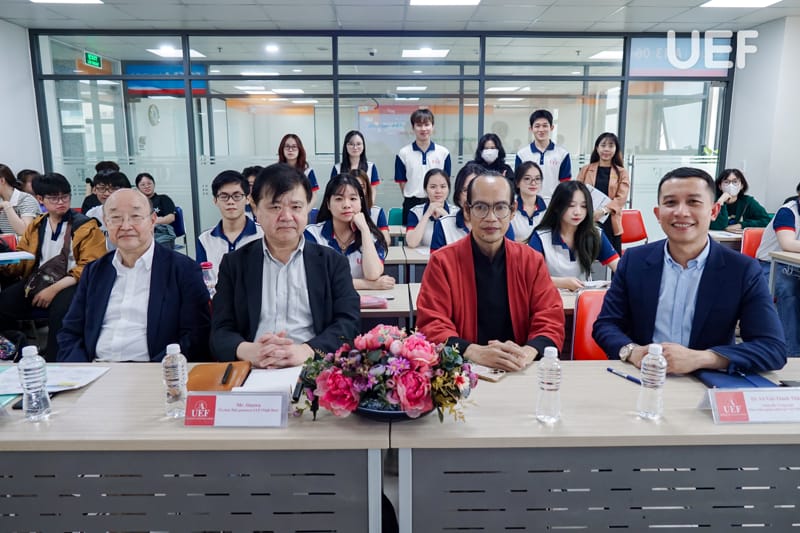INSTITUTE OF INTERNATIONAL EDUCATION
News and Events
UEFers explore Japanese business culture for international integration equipment
03/25/2025
In the era of globalization, having a deep understanding of corporate culture is not only an advantage but also the key to helping students seize career opportunities in an international environment. Japan, a leading economic power with a sustainable business philosophy and a unique management style, remains an appealing destination for those seeking to thrive in a professional, disciplined, and innovative workplace.
MARCH 24 - With the aim to provide Japanese Language students with practical insights, the Faculty of Languages and International Cultures at UEF organized a workshop titled "Essential Aspects of Japanese Business Culture.”

![]()
MARCH 24 - With the aim to provide Japanese Language students with practical insights, the Faculty of Languages and International Cultures at UEF organized a workshop titled "Essential Aspects of Japanese Business Culture.”


The workshop attracted numerous UEFers interested in the Japanese business culture
The event was featured by the presence of Mr. Vo Van Thanh Than, Director of UEF Center of Vietnam-Japan Human Resources Development; Mr. Fumio Okita, President of D&i partners LLP Organization (Japan); and Mr. Ozawa, Officer of D&i partners LLP Organization (Japan).
![]()

Mr. Vo Van Thanh Than presented appreciation to the keynote speaker
The main workshop's content included Japanese business management, both modern and traditional; and Japanese enterprise models in the context of integration. With practical and professional indicated insights, the keynote speaker, alongside with UEFers to approach the Japanese mindset and working style as well as the key factors to achieve success in working with Japanese enterprises.
Upon opening the event, Mr. Fumio Okita discussed the transformation of the Japanese economy after World War II. In the past, Japan thrived with a mass production model focused on quality. However, Japanese companies are now pivoting towards an overseas expansion strategy, guided by two key principles: "selection" and "focus," alongside a "win-win" model. A distinctive feature of Japanese business management is that changes occur gradually rather than through sudden workforce reductions or major disruptions. Instead, companies always seek appropriate solutions and aim to build consensus among employees, executives, and other stakeholders.
![]()
![]()
Upon opening the event, Mr. Fumio Okita discussed the transformation of the Japanese economy after World War II. In the past, Japan thrived with a mass production model focused on quality. However, Japanese companies are now pivoting towards an overseas expansion strategy, guided by two key principles: "selection" and "focus," alongside a "win-win" model. A distinctive feature of Japanese business management is that changes occur gradually rather than through sudden workforce reductions or major disruptions. Instead, companies always seek appropriate solutions and aim to build consensus among employees, executives, and other stakeholders.


Mr. Fumio Okita provided extensive perspectives on Japanese business culture
Additionally, the speaker highlighted the key characteristics that enable Japan to maintain its position in the global economy. Particular examples include the 5S philosophy in Japanese (Seiri – Sort, Seiton – Set in order, Seiso – Shine, Seiketsu – Standardize, Shitsuke – Sustain) and the "Three Actuals" principle (going to the actual place, seeing the actual object, and understanding the actual situation). He emphasized that teamwork is a crucial element of Japanese corporate culture. The Japanese place great importance on establishing effective mechanisms to ensure that every individual within an organization can work seamlessly together, thereby enhancing overall efficiency.
The workshop provided UEFers with practical case-study to help they gain insights on how Japanese enterprises get over their challenges and maintain development. Importantly, the business philosophy of Oumi merchants—the "Three-Way Good" principle (good for the seller, good for the buyer, and good for society)—was also mentioned as a guiding principle that helps Japanese companies achieve sustainable development.
![]()
![]()
![]()
The workshop provided UEFers with practical case-study to help they gain insights on how Japanese enterprises get over their challenges and maintain development. Importantly, the business philosophy of Oumi merchants—the "Three-Way Good" principle (good for the seller, good for the buyer, and good for society)—was also mentioned as a guiding principle that helps Japanese companies achieve sustainable development.



UEFers concentrated and interacted with the keynote speaker’s shared insights
Understanding and applying Japanese business mindset can be the key for young people to confidently enter the labor market and expand their career opportunities with Japanese enterprises. With the practical knowledge gained from the workshop, Japanese Language students have further deepened their understanding, equipping themselves with valuable skills to adapt and thrive in an international workplace environment.
TT.TT-TT
RELATED NEWS

















